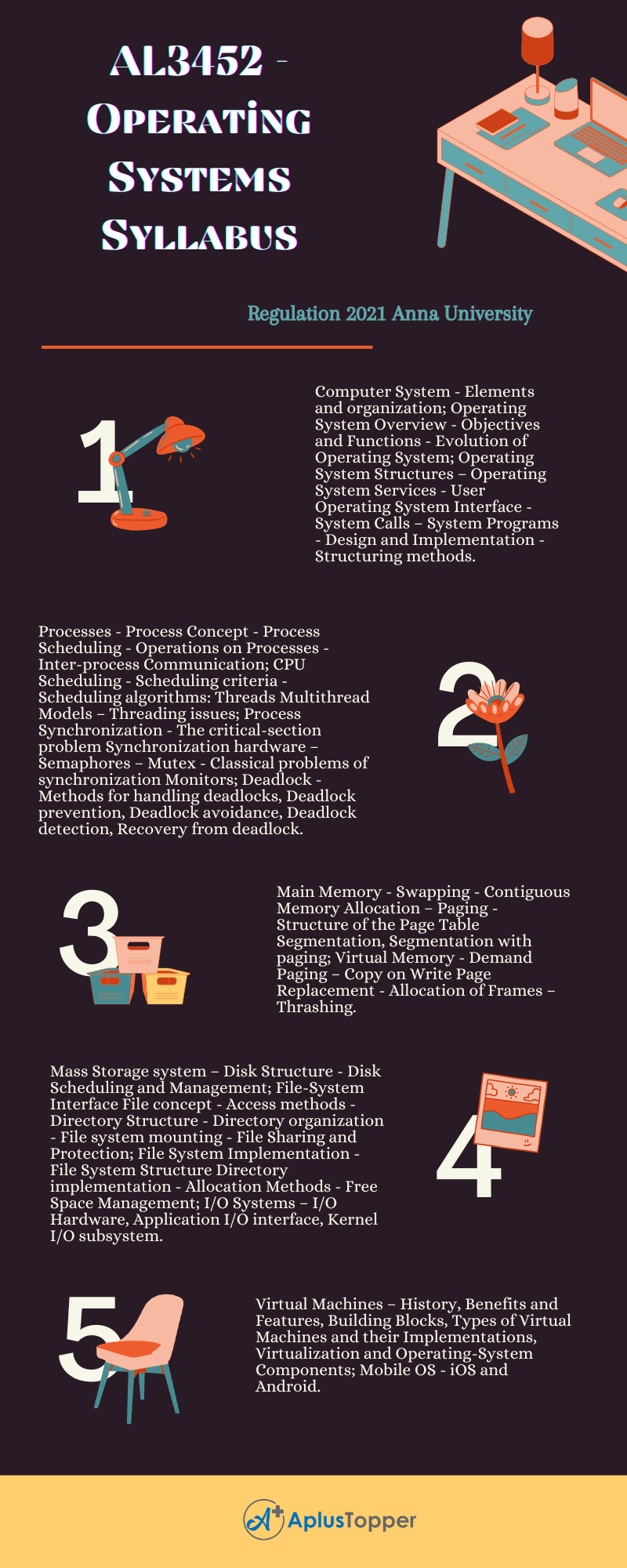Subject code AL3452 deals with semester IV of B.Tech Artificial Intelligence and Data Science regarding affiliated institutions of Anna University Regulation 2021 Syllabus. In this article, you can gather certain information relevant to the Operating Systems. We added the information by expertise.
We included the proper textbooks and references to assist in some way in your preparation. It will enhance your preparation and strategies to compete with the appropriate spirit with others in the examination. If you see, you can find the detailed syllabus of this subject unit-wise without leaving any topics from the unit. In this article AL3452 – Operating Systems Syllabus, You can simply read the following syllabus. Hope you prepare well for the examinations. I hope this information is useful. Don’t forget to share with your friends.
If you want to know more about the syllabus of B.Tech Artificial Intelligence And Data Science connected to an affiliated institution’s four-year undergraduate degree program. We provide you with a detailed Year-wise, semester-wise, and Subject-wise syllabus in the following link B.Tech. Artificial Intelligence And Data Science Syllabus Anna University, Regulation 2021.
Aim of Objectives:
- To understand the basics and functions of operating systems.
- To understand Processes and Threads
- To analyze Scheduling algorithms and process synchronization.
- To understand the concept of Deadlocks.
- To analyze various memory management schemes.
- To be familiar with I/O management and File systems.
- To be familiar with the basics of virtual machines and Mobile OS like iOS and Android.
AL3452 – Operating Systems Syllabus
Unit I: Introduction
Computer System – Elements and organization; Operating System Overview – Objectives and Functions – Evolution of Operating System; Operating System Structures – Operating System Services – User Operating System Interface – System Calls – System Programs – Design and Implementation – Structuring methods.
Unit II: Process Management
Processes – Process Concept – Process Scheduling – Operations on Processes – Inter-process Communication; CPU Scheduling – Scheduling criteria – Scheduling algorithms: Threads Multithread Models – Threading issues; Process Synchronization – The critical-section problem Synchronization hardware – Semaphores – Mutex – Classical problems of synchronization Monitors; Deadlock – Methods for handling deadlocks, Deadlock prevention, Deadlock avoidance, Deadlock detection, Recovery from deadlock.

Unit III: Memory Management
Main Memory – Swapping – Contiguous Memory Allocation – Paging – Structure of the Page Table Segmentation, Segmentation with paging; Virtual Memory – Demand Paging – Copy on Write Page Replacement – Allocation of Frames –Thrashing.
Unit IV: Storage Management
Mass Storage system – Disk Structure – Disk Scheduling and Management; File-System Interface File concept – Access methods – Directory Structure – Directory organization – File system mounting – File Sharing and Protection; File System Implementation – File System Structure Directory implementation – Allocation Methods – Free Space Management; I/O Systems – I/O Hardware, Application I/O interface, Kernel I/O subsystem.
Unit V: Virtual Machines And Mobile OS
Virtual Machines – History, Benefits and Features, Building Blocks, Types of Virtual Machines and their Implementations, Virtualization and Operating-System Components; Mobile OS – iOS and Android.
Text Books:
- Abraham Silberschatz, Peter Baer Galvin and Greg Gagne, “Operating System Concepts”, 9th Edition, John Wiley and Sons Inc., 2018.
- Andrew S Tanenbaum, “Modern Operating Systems”, Pearson, 4th Edition, New Delhi, 2016.
References:
- Ramaz Elmasri, A. Gil Carrick, David Levine, “Operating Systems – A Spiral Approach”, Tata McGraw Hill Edition, 2010.
- William Stallings, “Operating Systems: Internals and Design Principles”, 7th Edition, Prentice Hall, 2018.
- Achyut S. Godbole, Atul Kahate, “Operating Systems”, McGraw Hill Education, 2016.
Related Posts On Semester – IV:
You May Also Visit:
